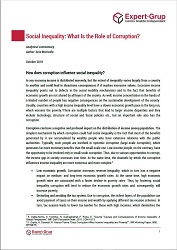Social Inequality: What Is the Role of Corruption?
Social Inequality: What Is the Role of Corruption?
Author(s): Iurie Morcotîlo
Subject(s): Socio-Economic Research, Corruption - Transparency - Anti-Corruption
Published by: EXPERT-GRUP Centrul Analitic Independent
Keywords: Social Inequality; Corruption; economy; income;
Summary/Abstract: In any economy income is distributed unevenly, but the extent of inequality varies largely from a country to another and could lead to disastrous consequences if it reaches excessive values. Excessive income inequality points out to defects in the social mobility mechanisms and to the fact that benefits of economic growth are not shared by all layers of the society. As well, income concentration in the hands of a limited number of people has negative consequences on the sustainable development of the society. Usually, countries with a high income inequality level have a slower economic growth pace in the long run, which worsens the poverty. There are multiple factors that lead to larger income disparities and they include technology, structure of social and fiscal policies etc., but an important role also has the corruption.
Series: EXPERT-GRUP — Comentarii economice publicaţii
- Page Count: 4
- Publication Year: 2018
- Language: English
- Content File-PDF

